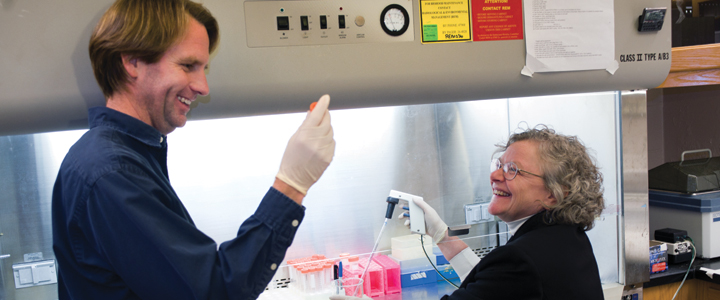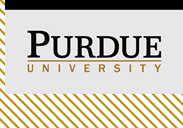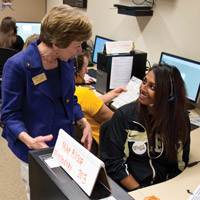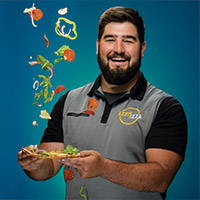
Diseases such as diabetes, Parkinson’s and heart disease provide myriad research questions for scientists. While one researcher is studying how relationships affect a person’s eating habits while trying to manage a disease, another may be looking at the gene expression related to the disease.
A new group in the College of Health and Human Sciences (HHS) is bringing professors and students together to help them connect via similar, yet different, research interests. This past year, the HHS Chronic Disease Research interest group focused on neurodegenerative disease, statistical modeling and diabetes, cancer and cardiovascular disease. The topics were selected based on feedback and interests from faculty.
“Interdisciplinary groups are powerful because they can work together to negotiate for funding or research equipment,” says Dorothy Teegarden, professor of nutrition science, pictured above with Sean Newcomer, assistant professor of health and kinesiology. “This was a way to introduce faculty, staff and students who may not have interacted before the nine departments were brought together in this new college. Research in chronic diseases is a strength for the new college, so we worked to bring together existing research efforts to enhance collaborations across campus.”
It is too early to see concrete results from the introductions, but the group did accomplish its primary goal in connecting people in the college and on campus.
Thanks to the experience, Melissa Franks, assistant professor of human development and family studies, was introduced to a professor in health and kinesiology and a communication professor in the College of Liberal Arts. Franks, who presented during the statistical modeling and diabetes session, focuses on chronic disease management and relationships, specifically couples. Karen Yehle, assistant professor of nursing and a presenter in the cardiovascular session, also began conversations with colleagues in health and kinesiology and human development and family studies.
The sessions, which also regularly included student attendance, emphasized connecting students with faculty and labs outside of their primary areas of study.
“I believe socializing students to an interdisciplinary approach to research is crucial,” says Yehle, who also was part of the group’s organizing committee. “Introducing students to the value of interdisciplinary research early on will encourage them to work in interdisciplinary teams. This is especially important in health care.”
The year concluded with a poster session competition for students in any related field.
“The series and poster session showcase what we do in the college and help others understand who we are,” Teegarden says. “This was an incredible opportunity for students to understand the different disciplines and approaches there are in research.”
The group continued the series in the fall to spark more faculty discussions and collaborations.











